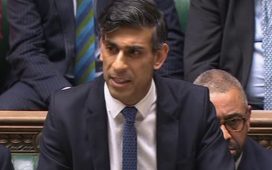European officials have said “proper negotiations” on a post-Brexit treaty between the UK and European Union have barely started, as time runs out to secure a deal.
The EU chief negotiator Michel Barnier will meet his British counterpart David Frost in Brussels for a working dinner on Tuesday evening, which will be followed by two days of talks on all the main sticking points, including “fair” competition, fisheries, police and judicial co-operation.
This will be the seventh negotiating round, but EU officials are concerned that the two sides have yet to begin detailed talks on a legal text – the EU has submitted a 440-page draft treaty, while the government has published 723 pages of text over 12 documents.
“On most topics we are not in proper negotiations,” said one EU official, referring to the absence of talks on a legal document. “We are still talking about the framework. On no issue are we discussing text.”
Frost has said an agreement can be reached in September, while insisting the government will not compromise British sovereignty “over our laws, our courts, or our fishing waters”.
The Brexit transition period ends on 31 December 2020 and the EU says a legal text must be nailed down by October at the latest.
Barnier last month accused the British of not showing “engagement and readiness to find solutions respecting the EU’s fundamental principles and interests”. EU sources say that the absence of UK “engagement” raises doubts about the prospects of an autumn breakthrough. “You need incremental changes to have a big breakthrough,” said the official.
While the EU has floated a compromise on fisheries and the UK has softened its stance on dispute settlement and governance of the agreement, the two sides remain deadlocked on the crucial issue of ‘fair’ competition.
Scotland’s largest teaching union has made a direct plea to Nicola Sturgeon, urging her to do more to make schools safe from the risk of coronavirus.
In an unusual move, the general secretary of the EIS Larry Flanagan has written directly to the first minister as a number of new pupil infections emerged: since Monday, there have been 8 cases of pupils with coronavirus, at 6 different primary and secondary schools across 3 NHS boards. Yesterday nearly one in four new infection cases were amongst school pupils.
After a staggered return last week, all pupils across Scotland are now back at school full-time. Yesterday, the Scottish government’s national clinical director Jason Leitch warned about the infection risk from older pupils attending house parties and large social gatherings with no distancing, as well as parents gathering at school gates and families failing to quarantine after returning from holidays abroad.
In his letter this morning, Flanagan asked “why the Scottish Government thinks that it is acceptable that inside schools these rules don’t apply, where up to 33 pupils may be in a closed confined area, i.e. a classroom, with as many different households as there are people?”
Flanagan also called on the government to fund the hiring of 3500 new teachers”so that we can reduce class sizes and make possible physical distancing” and provide stronger advice on face coverings: “You cannot visit a museum without one but again schools are different?”
Nicola Sturgeon is expected to address the matter in an unscheduled coronavirus briefing later this morning.
People living alone are twice as likely to test positive for Covid-19, and the vast majority of new positive cases detected appear to be asymptomatic, according to analysis from the Covid-19 infection survey from the Office for National Statistics.
The survey shows individuals in a one-person household are twice as likely to test positive for the virus, compared with individuals from a two-person household. However, there is no evidence that individuals living with three or more others are at a higher risk of testing positive than those living in two-person households.
The survey also shows just over a quarter (28%) of individuals who tested positive reported having symptoms, which suggests the majority of new cases may be asymptomatic. However, as the analysis is based on the ONS infection survey, these symptoms were self-reported as opposed to being professionally diagnosed. The analysis was based on 165 individuals who tested positive.
The survey also includes antibody tests to assess who has had the virus in the past. Minority ethnic people are twice as likely to have coronavirus antibodies. Asian or Asian British people are five times more likely than white respondents to test positive for the virus from a swab test.
People working in patient-facing healthcare or resident-facing social care roles also have a higher rate of testing for antibodies than for other adults of a working age.
Age and sex appear to have no impact on the likelihood of individuals testing positive for the virus. Over an eight-week period, there was no evidence for A difference in likelihood of males contracting the virus compared with females. Younger people were no more or less likely to have the virus than older respondents.
Updated
















